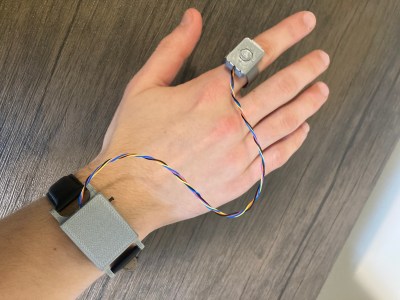
Okay, so this isn’t a traditional keyboard, but you can probably figure out why the RuneRing is here. Because it’s awesome! Now, let me give you the finer points.
Hugely inspired by both ErgO and Somatic, RuneRing is a machine learning-equipped wearable mouse-keyboard that has a configurable, onboard ML database that can be set up to detect any gesture.
Inside the ring is a BMI160 6-axis IMU that sends gesture data to the Seeed Studio nRF52840 mounted on the wrist. Everything is powered with an 80mAh Li-Po lifted from a broken pair of earbuds.
Instead of using a classifier neural network, RuneRing converts IMU data to points in 24-dimensional space. Detecting shapes is done with a statistical check. The result is a fast and highly versatile system that can detect a new shape with as few as five samples.
A Nexus of Keyboarding Ideas
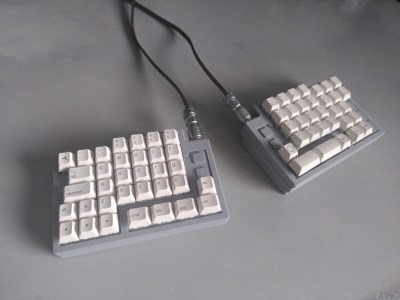
You might guess from a glance at this experimental split keyboard that [Fraawlen-dev] is left-handed, but that’s not the reason for the left-side arrow keys. [Fraawlen] sits sideways at the computer, left side facing the screen keyboard. In fact, that’s why most of the modifiers and media keys are over there as well.
The Nexus is [Fraawlen-dev]’s first split (and ortho), and it looks great in this ortholinear layout with a pinky stagger. This 3D-printable hand-wired keyboard is designed to work with as many keycap sets as possible. In fact, that’s what prompted this build — re-using existing keycaps. Under the hood are a couple of Pro Micros running the ever-popular QMK.
The awesome thing about designing something ultra-personal to you and then sharing it is that, inevitably, someone else down the line will find it useful enough to spin it off into something ultra-personal to them.
The Centerfold: Blue M&Ms In 1976? I’ll Allow It!
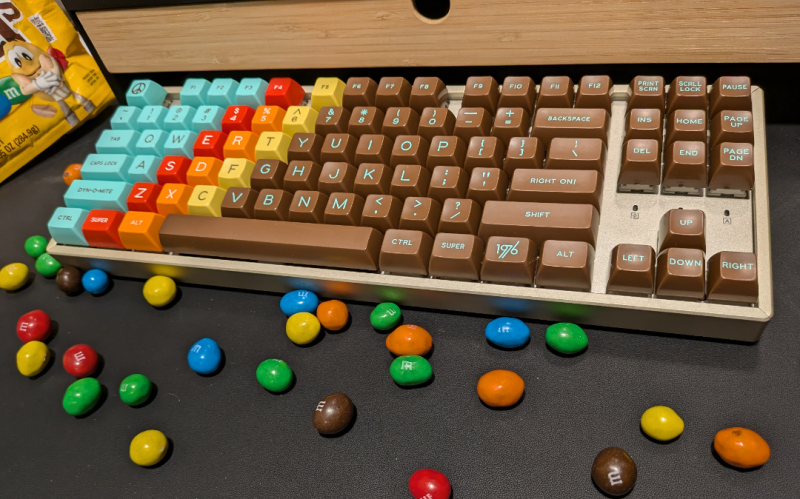
Ahh, the classic Signature Plastics 1976 keycap set in all its chocolate-y glory. What can I say? I’m a sucker for candy colors, especially on keyboards. And candy. And now I want this keycap set all over again. You want to see mouthwatering keycaps? Try two thumb clusters full of 1u and 2u caps without legends. I’m drooling, here. Anyway, I’m not sure what keyboard that is, but the gold sure puts a wrapper on the whole candy thing.
Do you rock a sweet set of peripherals on a screamin’ desk pad? Send me a picture along with your handle and all the gory details, and you could be featured here!
Historical Clackers: the McCool Typewriter Kind of Wasn’t So Cool
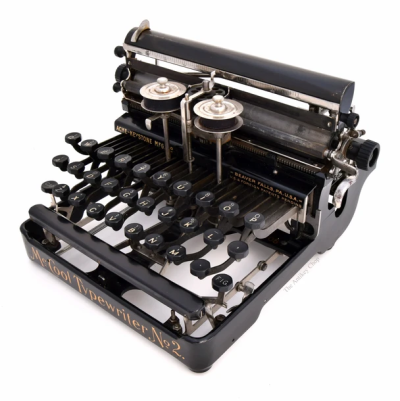
Why? Well, because unfortunately, by the time it finally went into production in 1909, it was already outdated. That’s because it borrowed outdated technologies from other typewriters.
For just one year, before a fire spread from the factory next door causing an estimated $1M in damage, the McCool typewriter was produced and sold by the Acme-Keystone Manufacturing Company.
It was a bargain at $25, and fairly portable at 12 pounds. The double-shift keyboard typed a total of 84 characters. Borrowed mechanical innovations included a Blickensderfer-esque typewheel, a hammer like Commercial Visible, and a hammer extension arm like a Chicago.
Even so, it’s a righteous-looking machine. Then again, I’m a sucker for octagonal keys and portability.
ICYMI: Floorboard Is a Robust Pedal Keyboard
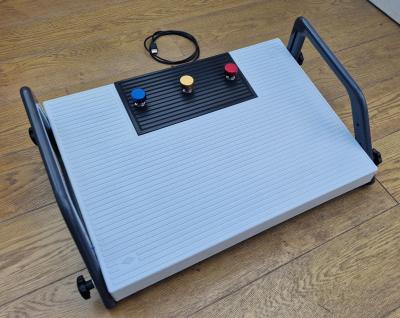
This foot keyboard is one after my own heart. If you’ll recall, a few years ago, I made a keyboard out of a footstool with the buttons perpendicular to the floor. I have to say that [Wingletang]’s Floorboard is a strictly better design.
For one thing, it’s made from sturdier stock. While my base is more of a step stool than anything else, [Wingletang] started an actual foot rest meant to hold both feet and switches for typing from dictation.
They settled on Ctrl, Alt, and Shift for the buttons, which are meant for guitar stomp pedals. I used 35mm arcade buttons, and while those have held up, they’re certainly no stomp switches. [Wingletang] added toppers to increase the area and make them easier and more comfortable to stomp.
I love that [Wingletang] printed a new compartment to hold everything, because it looks better than the original and of course has its various purposes, like cable management.
Got a hot tip that has like, anything to do with keyboards? Help me out by sending in a link or two. Don’t want all the Hackaday scribes to see it? Feel free to email me directly.
